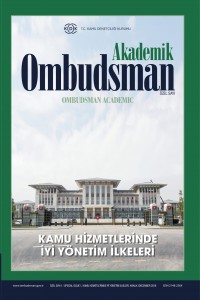Araştırma Makalesi
Yıl 2018,
Sayı: 1, 163 - 181, 31.12.2018
Öz
Yönetişim, 1990’lı
yıllarda düzenleyici devletin yönetim biçimi olarak kamu yönetimi literatürüne
girmiştir. Sözkonusu kavram, Dünya Bankası (DB), Ekonomik Kalkınma ve İşbirliği
Örgütü (OECD) ile Avrupa Birliği (AB) tarafından geliştirilip
yaygınlaştırılmıştır. AB, yönetişim ilkelerini geliştirmiş ve kamu yönetiminin
katılım, hesapverebilirlik, şeffaflık, tutarlılık, orantılılık, yerellik
ilkelerini hayata geçirmesi gerektiğini ileri sürmüştür. Bu çalışma, yönetişim
ilkelerinin Türkiye’de kamu yönetiminde gerçekleştirilip
gerçekleştirilmediğinin Yüksek Öğretim Kurulu örneği ile ortaya koyulmasını
amaçlamaktadır. Bu amacı gerçekleştirmek için literatür taraması yapılarak
betimleyici bir çalışma gerçekleştirilmiştir.
Anahtar Kelimeler
Kaynakça
- Agenda 21 (1992). United Nations Conference on Environment&Development, Rio de Janerio,http://sustainabledevelopment.un.org/content/documents/Agenda21.pdf (Erişim Tarihi: 15.01.2014).
- Baransel, Atila (1979). Çağdaş Yönetim Düşüncesinin Evrimi Klasik ve Neo Klasik Yönetim ve Örgüt Teorileri, İstanbul Üniversitesi İşletme Fakültesi İşletme İktisadı Enstitüsü, İstanbul.
- Bevir, Mark, (2009). Key Concepts in Governance, Sage Publication, India.
- BM (1996). İnsan Yerleşimleri Konferansı Habitat II Türkiye Ulusal Rapor ve Eylem Planı, (İstanbul).
- Briggs, Asa (2006). “The Welfare State in Historical Perspective” Pierson, Christopher ve Francis G. Castles (Ed.) The Welfare State: Reader, USA: 16-28.
- Commission of the European Communities (2001). European Governance – A White Paper, COM 428, http://eurlex.europa.eu/search.html?type=expert&qid=1399360618888, (Erişim Tarihi: 02.02.2014).
- Devlet Yükseköğretim Kurumlarında Öğretim Elemanı Norm Kadrolarının Belirlenmesine Ve Kullanılmasına İlişkin Yönetmelik, R.G.: 02.11.2018, Sayı:30583.
- Frederickson, George H. (2004). Whatever Happened to Public Administration? Governance, Governance Everywhere, Working Paper, http://www.queens-belfast.com/schools/SchoolofLaw/Research/InstituteofGovernance/Publications/briefingpapers/Filetoupload,47649,en.pdf, ( Erişim Tarihi: 05.02.2014).
- Governance and Development, COM (2003). 615 final, s.3, Communication from the Commission to the Council, The European Parliament and the European Economic and Social Committee, http://eur-lex.europa.eu/legalcontent/EN/TXT/PDF/?uri=CELEX:52003DC0615&from=EN, (Erişim Tarihi: 02.02.2014).
- Göze, Ayferi (2010). Liberal Marxiste Faşist Nasyonel Sosyalist ve Sosyal Devlet, (İstanbul: Beta).
- Jessop, Bob (1998). “The Rise of Governance and the Risks of Failure: The Case of Economic Development”, International Social Science Journal, 50 (155): 29-45.
- Kamu Denetçiliği Kurumu (2017). 2016 Yıllık Raporu, Ankara.
- Kamu Denetçiliği Kurumu (2018). 2017 Yıllık Raporu, Ankara.
- Majone, Giandomenico (1997). “From the Positive to the Regulatory State: Causes and Consequences of Changes in the Mode of Governance”, Journal of Public Policy, 17 (2): 139-167.
- OECD (2005). Modernising Government – The Way Foreward, http://www.oecd.org/gov/modernisinggovernmentthewayfor ward.htm, (Erişim Tarihi: 03.02.2014).
- Rhodes, R.A.W. (1996). “The New Governance: Governing without Government”, Political Studies, 44 (4): 652-667.
- Santiago, Paulo, Karine Tremblay, Ester Basri ve Elena Arnal (2008). Tertiary Education for the Knowledge Society, Vol.1, OECD Publication.
- Sub-Saharan Africa: From Crisis to Sustainable Growth (1989). (Washington The World Bank), http://wwwwds.worldbank.org/external/default/WDSContentServer/WD SP/IB/1999/12/02/000178830_98101901364149/Rendered/PDF/ multi0page.pdf, (Erişim Tarihi: 06.01.2014)
- Wilson, Woodrow (1887). “The Study of Administration”, Political Science Quarterly, Vol.2, No.2, 197-222.
- World Development Report (1997). The State in a Changing World, http://wdronline.worldbank.org//worldbank/a/c.html/world_ development_report_1997/abstract/WB.0-1952-1114- 6.abstract, (Erişim Tarihi: 14.12.2013).
- Yüksek Öğretim Dergisi (2018/09). http://www.yok.gov.tr/YOK_Dergisi/YOK_Dergi_09/HTML/index.html#4, (Erişim Tarihi:06.10.2018).
- Yükseköğretim Kalite Güvencesi Yönetmeliği, R.G.: 23.07.2015, Sayı : 29423.
- Yükseköğretim Kurulu Stratejik Planı (2015). Ankara.
Yıl 2018,
Sayı: 1, 163 - 181, 31.12.2018
Öz
Kaynakça
- Agenda 21 (1992). United Nations Conference on Environment&Development, Rio de Janerio,http://sustainabledevelopment.un.org/content/documents/Agenda21.pdf (Erişim Tarihi: 15.01.2014).
- Baransel, Atila (1979). Çağdaş Yönetim Düşüncesinin Evrimi Klasik ve Neo Klasik Yönetim ve Örgüt Teorileri, İstanbul Üniversitesi İşletme Fakültesi İşletme İktisadı Enstitüsü, İstanbul.
- Bevir, Mark, (2009). Key Concepts in Governance, Sage Publication, India.
- BM (1996). İnsan Yerleşimleri Konferansı Habitat II Türkiye Ulusal Rapor ve Eylem Planı, (İstanbul).
- Briggs, Asa (2006). “The Welfare State in Historical Perspective” Pierson, Christopher ve Francis G. Castles (Ed.) The Welfare State: Reader, USA: 16-28.
- Commission of the European Communities (2001). European Governance – A White Paper, COM 428, http://eurlex.europa.eu/search.html?type=expert&qid=1399360618888, (Erişim Tarihi: 02.02.2014).
- Devlet Yükseköğretim Kurumlarında Öğretim Elemanı Norm Kadrolarının Belirlenmesine Ve Kullanılmasına İlişkin Yönetmelik, R.G.: 02.11.2018, Sayı:30583.
- Frederickson, George H. (2004). Whatever Happened to Public Administration? Governance, Governance Everywhere, Working Paper, http://www.queens-belfast.com/schools/SchoolofLaw/Research/InstituteofGovernance/Publications/briefingpapers/Filetoupload,47649,en.pdf, ( Erişim Tarihi: 05.02.2014).
- Governance and Development, COM (2003). 615 final, s.3, Communication from the Commission to the Council, The European Parliament and the European Economic and Social Committee, http://eur-lex.europa.eu/legalcontent/EN/TXT/PDF/?uri=CELEX:52003DC0615&from=EN, (Erişim Tarihi: 02.02.2014).
- Göze, Ayferi (2010). Liberal Marxiste Faşist Nasyonel Sosyalist ve Sosyal Devlet, (İstanbul: Beta).
- Jessop, Bob (1998). “The Rise of Governance and the Risks of Failure: The Case of Economic Development”, International Social Science Journal, 50 (155): 29-45.
- Kamu Denetçiliği Kurumu (2017). 2016 Yıllık Raporu, Ankara.
- Kamu Denetçiliği Kurumu (2018). 2017 Yıllık Raporu, Ankara.
- Majone, Giandomenico (1997). “From the Positive to the Regulatory State: Causes and Consequences of Changes in the Mode of Governance”, Journal of Public Policy, 17 (2): 139-167.
- OECD (2005). Modernising Government – The Way Foreward, http://www.oecd.org/gov/modernisinggovernmentthewayfor ward.htm, (Erişim Tarihi: 03.02.2014).
- Rhodes, R.A.W. (1996). “The New Governance: Governing without Government”, Political Studies, 44 (4): 652-667.
- Santiago, Paulo, Karine Tremblay, Ester Basri ve Elena Arnal (2008). Tertiary Education for the Knowledge Society, Vol.1, OECD Publication.
- Sub-Saharan Africa: From Crisis to Sustainable Growth (1989). (Washington The World Bank), http://wwwwds.worldbank.org/external/default/WDSContentServer/WD SP/IB/1999/12/02/000178830_98101901364149/Rendered/PDF/ multi0page.pdf, (Erişim Tarihi: 06.01.2014)
- Wilson, Woodrow (1887). “The Study of Administration”, Political Science Quarterly, Vol.2, No.2, 197-222.
- World Development Report (1997). The State in a Changing World, http://wdronline.worldbank.org//worldbank/a/c.html/world_ development_report_1997/abstract/WB.0-1952-1114- 6.abstract, (Erişim Tarihi: 14.12.2013).
- Yüksek Öğretim Dergisi (2018/09). http://www.yok.gov.tr/YOK_Dergisi/YOK_Dergi_09/HTML/index.html#4, (Erişim Tarihi:06.10.2018).
- Yükseköğretim Kalite Güvencesi Yönetmeliği, R.G.: 23.07.2015, Sayı : 29423.
- Yükseköğretim Kurulu Stratejik Planı (2015). Ankara.
Toplam 23 adet kaynakça vardır.
Ayrıntılar
| Birincil Dil | Türkçe |
|---|---|
| Bölüm | 2018 Yılı Özel Sayı/Kamu Hzimetlerinde İyi Yönetim İlkeleri |
| Yazarlar | |
| Yayımlanma Tarihi | 31 Aralık 2018 |
| Kabul Tarihi | 25 Aralık 2018 |
| Yayımlandığı Sayı | Yıl 2018 Sayı: 1 |


